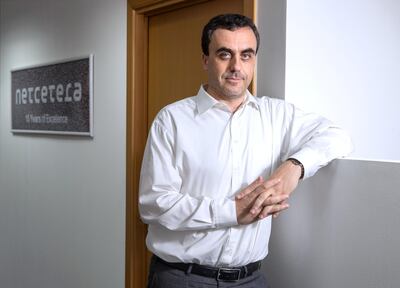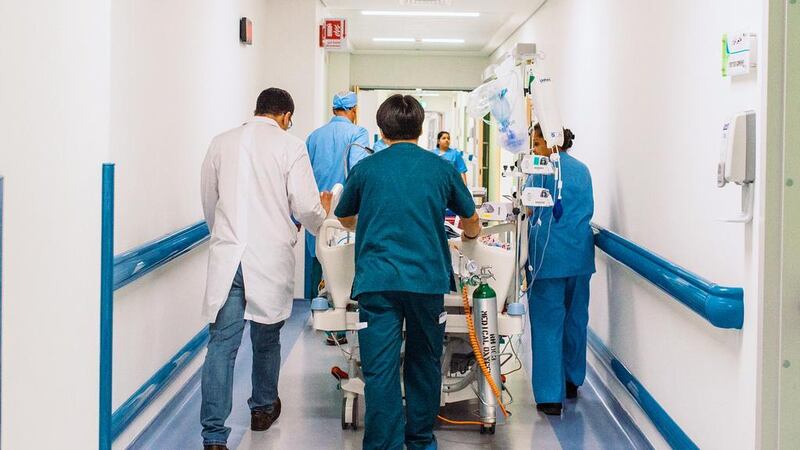Artificial intelligence applied by health insurers could help save millions of dirhams a year in fraud and abuse within the UAE healthcare system, analysts claim.
Swiss software company Netcetera has completed a successful trial of its latest technology within a major health insurer, spotting almost 37,000 suspicious claims made by more than 4,000 doctors between 2016-17.
Those bogus claims totalled Dh21 million and would usually have gone unnoticed by insurers, who would end up paying out for unnecessary treatments given by hospitals and clinics.
The system developed by Netcetera uses an AI model that runs an algorithm to detect a pattern of behaviour.
The AI model built into an insurers claim system will recognise a usual pattern of prescriptions and raise a red flag when a doctor delivers an abnormal course of treatment.
So far, only one unnamed insurer has trialled the software, but with good effect.
If rolled out across the industry, billions of dirhams could be saved by cleaning up the culture of waste, abuse and fraud, UAE healthcare experts claim.

“We have been working in this industry for about eight years, and with insurance companies in different areas, so we know there is a need for this detection process,” said Kiril Milev, managing director of Netcetera Middle East.
“In many cases, suspect claims are not always fraudulent, but can be general misuse and waste.
“If doctors don’t want to take risks, they will prescribe the most expensive treatment available. This is not always appropriate.
“Sometimes members will try to get some kind of care or treatment they are not entitled to.
“In general, waste and abuse is happening everywhere but in countries like the UAE, the problem is systematic as it is driven by the way people are contracted to offer certain treatments to avoid risk and maximise profits.”
The software system is designed to monitor and report suspicious behaviour and teaches itself to continuously evolve using machine learning.
Checks are similar to those used by banks in credit card transactions, where the system monitors the validity of a transaction against a predefined set of business rules.
In a year-long trial with an insurer, developers said the software was able to detect an "absurd" amount of fraud, waste and abuse by analysing claims data from 2016-17.
The UAE is ranked 10th on a global list of efficient health care.
The data takes into consideration life expectation, relative cost measured by total health expenditure as a percentage of gross domestic product and absolute cost, a simple per capita total health expenditure.
Hong Kong tops that health efficiency list, published by Bloomberg, followed by Singapore and Spain.
In 2016, new regulations introduced by Health Authority Abu Dhabi cut benefits for government employed Emiratis and residents, and Dubai Health Authority and the Ministry of Health and Prevention made similar changes to insurance standards.
In August, Abu Dhabi healthcare facilities began dispensing cheaper generic medicines rather than brand-name drugs to provide better value for money.
Over-prescription has been a common problem in the country, wasting billions of dirhams each year.
Doctors who regularly overprescribe risk being blacklisted by insurance companies and fines can be imposed if insurers believe they have paid out unnecessarily.
Software developers at Netcetera claim their RiSIC programme can double the savings of an insurance provider.
“The UAE specifically is a high risk market for insurers because the healthcare market is growing at such a fast pace,” said Timo Nurminen, who has been closely involved with developing the software with Netcetera.
“The market here is dominated by the private sector and there is mandatory insurance requirement.
“Working with our first customer, we detected absurd amounts of fraud, waste and abuse.”
________________
Read more:
Some UAE dentists caught out for grossly over-treating patients
Expert: sweeping changes to health care in Abu Dhabi bring down the cost of health insurance
Abu Dhabi healthcare providers start dispensing generic drugs
__________________
A 2010 World Health report estimated about 20 to 40 per cent of all health sector resources are wasted.
A study by Niyi Awofeso at the Department of Health Care Management, School of Health and Environmental Studies, Dubai concluded that better training of health professionals would help reduce the problem.
“In the UAE, measures being put in place to ensure the efficiency and sustainability of health services are paying dividends, but there is ample room for improvement,” said Mr Awofeso.
“Using the Emirates ID to validate claims in Abu Dhabi and Dubai has been a success. Fraud is estimated to add about 10 per cent in insurance premium charges and makes it expensive for many.
“Given health care professionals in the United States are the biggest contributors to healthcare fraud losses, ethics training for Dubai’s healthcare professionals may require an update to emphasise the need to avoid these acts.”







